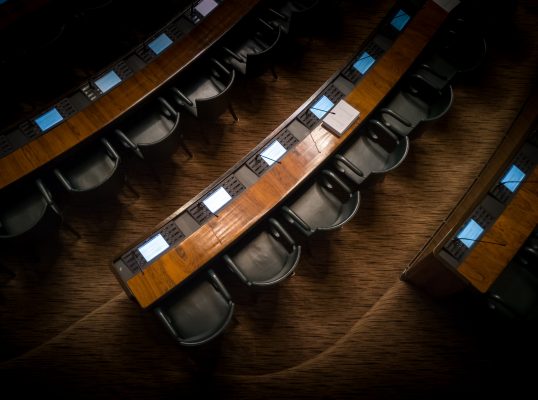[Update] The first media platform to take State Media Registry into court became the online news site, 24saat.org according to reporting by Meydan TV. The site was refused its registry on the grounds that the activities on the said news website were not regular. The site’s management claims the decision was unlawful.
***
In Azerbaijan according to the new law on media that was adopted in January 2022 and approved by the President in February 2022, all online media outlets as well as journalists working for online media platforms or working as freelance journalists were ought to register with a new media registry system. This media registry system began to operate on October 14, 2022, according to reporting by Turan News Agency. The law itself was heavily criticized by the local civil society prior to its adoption, and many anticipated many of its restrictive features put in practice. AIW published this overview of the law in March 2022 describing some of its most problematic features including the media registry clause.
According to the new law, Azerbaijan must establish a registry system of online media outlets and journalists working for online media platforms or working as freelance journalists. This and other additional provisions of the law raise a number of questions regarding the compliance of the law with the international standards on media freedom.
Article 62.1 reads that permission from state bodies is not required for setting up online media. But Article 62.2 requires that an online media entity must apply to the relevant executive authority (Media Registry) 7 days prior to the publication or dissemination of the relevant media material. In other words, while there is no need to apply for creating an online media platform, there is a requirement to apply for a permit once the online resource becomes operational and starts publishing. Article 62.4 requires an additional opinion issued by the State Committee for Work with Religious Organizations before an online media focusing on religion and religious content is set up. In addition, Article 78.3 obligates online media to apply to the Media Registry within 6 months since the platforms become operational.
Article 60.5 requires online media to publish at least 20 articles per day to qualify as an online media platform.
Article 26 obligates the founder of the online media to be a citizen of the Azerbaijan Republic permanently residing in the Azerbaijan Republic. In case the founder is a legal entity, then the highest share (75 percent) in the authorized capital must belong to a citizen (citizens) of Azerbaijan permanently residing in the country.
The Cabinet of Ministers has been instructed to prepare regulation on the provision of registration at the Media Registry within 3 months as per presidential order “on the application of the Law of the Republic of Azerbaijan ‘On Media’ and regulation of a number of issues arising from it” dated February 8, 2022. And Article 60 of the new law requires that online media outlets disclose their organizational information on their respective websites. Article 60.2 also requires online media to register with the tax authorities, and identify and appoint a person responsible for editorial.
Article 26.3 prohibits previously convicted individuals from setting up media platforms. The list of previous convictions is exhaustive including serious or especially serious crimes; crimes against public morality; persons whose convictions have not been expunged or revoked; including political parties (excluding print media); and religious organizations (excluding print media). Prohibiting religious and political organizations from establishing online media is a failure to comply with the international standards on the right to freedom to seek, receive and impart information and ideas of all kinds.
Importance of registering with the Media Registry for online media platforms
The Media Register is an electronic information resource managed by a Media Development Agency which is managed by the Supervisory Board consisting of the Chairman and 6 (six) members appointed by the President of the Republic of Azerbaijan. In order to be registered at the Media Registry as a media entity (subject), a media entity can apply either as a legal entity or as a sole entrepreneur (Article 74).
Article 74.2 sets out a list of requirements journalists must comply with for their inclusion in the registry. These requirements include a degree in higher education as well as another number of different merit-based criteria. Article 74.2.5 requires that journalists obtain and provide an employment contract with a media entity. Individuals or freelance journalists must have a civil contract with at least one media entity registered at the Media Registry in order to be able to register at the media registry.
Those outlets who succeed at registering with the Media Register are issued certificates (which grant access to government events, press conferences and etc.), and journalists are issued press cards (valid for three years and subject to renewal upon request). Media entities, including online media outlets not included in this registry, will not be considered mass media, and subsequently, unable to hire journalists. Also, in case the online media platform is not registered by the registry, journalists who have contracts with these online media platforms, won’t be admitted to the Media Registry and won’t be issued press cards.
Registration with the Media Register is one of the main guarantees for the free operation of media outlets and journalists. For example, according to Article 72.6 of the Law, only media entities and journalists included in the Media Register may carry on with their work during military and/or state of emergency situations, in special operations against religious extremism, and in operations against terrorism.
In the absence of certificates issued exclusively by the register, journalists may also not be allowed to conduct polls on the streets.
These and other requirements as outlined in the law, create additional challenges for freelance journalists working (on contracts) with international media outlets or local online media outlets not registered with the Media Register.
Now, according to Turan News Agency, at least 15 online news platforms have been denied registry. Among them is 24saat.org – a news website that remains blocked in Azerbaijan according to AIW/OONI measurement reports. To bypass censorship, the founders of the website, created a new URL az24saat.org which according to the website’s director Vugar Gurjanly is still accessible. However, in an interview with Turan News Agency, Gurjanly lamented the registration process and getting it denied. Gurjanli believes the decision was not justified and aimed at eventually stopping the news site from working. “Our website meets all the necessary criteria,” Gurjanly told Turan News Agency. According to Article 78.3 of the new Media Law, active mass media must apply to the Agency within six months from the day the Registry starts working. In the event media fails to do so, or the information provided during the registration process is found incorrect the agency has a right to take the media to court.
Speaking to Azadliq Radio, Azerbaijan Service for Radio Liberty, media law expert, Khalid Aghaliyev said, the currently applied regulations on media platforms trying to register with the Agency are unconstitutional because according to the law, the registration regulations of the new law should apply to the media platforms established after the said law was adopted. “The media that existed prior to the adoption of the law should be registered automatically,” said Aghalyev.
But this is not the only problem concerning media platforms. The law also demands that the media platform must publish at least 100 news items per week. But the agency already showing a biased approach to this specific regulation. According to Aghaliyev, a number of news sites that were registered have failed to meet the criteria, and yet those that have met the 100 items per week criteria have been denied registry.
Articles 74.1.2 and 60.5 of the Law, define the criteria of published content as well as what the Media Agency means when it demands a continuity of activities. As such, media platforms applying for registration must demonstrate continuity in their work for at least 20 days a month and publish a minimum of 20 news items per day for their activity to be considered “continuous.”
Those who have been denied the registry are now planning to appeal in local courts. According to information provided by the Media Agency, it has so far registered 100 media platforms, denied 15, and is reviewing 40 applications.
![Azerbaijan’s Media Registry leaves media platforms in limbo [Updated January 5, 2023]](https://www.az-netwatch.org/wp-content/uploads/2020/01/StockSnap_SA07EZX8KU-600x400.jpg)


